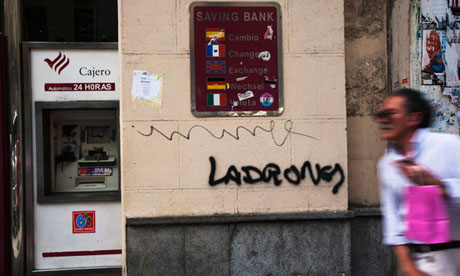Borrowing costs jump and stock markets fall as investors seek safer havens
A man walks past graffiti on the wall of savings bank Cajastur in Madrid on 26 June. Photograph: Susana Vera/Reuters
Spain and Italy were mired in financial woes again on Tuesday after borrowing costs jumped, stock markets fell and local politicians warred with each other over who is to blame for the financial crisis.
Spanish borrowing costs jumped following the government's application for a €100bn eurozone rescue facility to prevent the country's banks going bust.
The interest rate on a batch of three- and six-month bonds almost doubled as the precarious situation of Spain's banking sector and the knock-on effects for government finances sent most investors scurrying for safer havens.
A lack of agreement in Brussels during the day also panicked bond investors, many of which have lent billions of euros to crisis-hit countries, raising the cost of long-term borrowing. Reported comments by Angela Merkel that Europe would not have pooled debt liability "as long as I live" added to investor concern.
Bond auctions have become a litmus test of a country's viability and rebuilding the faith of private investors lies at the heart of discussions between European leaders. While the focus has been on Spain and Italy and the countries in receipt of direct EU funds – Ireland, Portugal and Greece – France is also under the spotlight. After a brief honeymoon following the election of President François Hollande last month, French interest rates have begun to rise.
Bill Blain, a strategist at Newedge Group in London, said: "Once the sheer misery of Spain and Italy is figured in, the next target will be France. I'm seeing a very small number of international institutional players buying French debt. People are very nervous."
Hollande is expect to revise his budget in the next few weeks to take account of falling tax revenues and promises he has made to generate growth and employ 60,000 extra public sector jobs.
The interest rate on the French benchmark 10-year bond advanced to 2.63%, up from a euro-era low of 2.071% on June 1. It was as high as 2.902% on 15 May, when Hollande took office.
European stock markets were relatively placid ahead of the Brussels summit, though Spain's IBEX 35 Index dipped 1.5% and Italy's MIB
http://www.guardian.co.uk/business/2012/jun/26/spain-italy-suffer-new-economic-setbacks

No comments:
Post a Comment